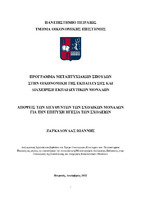Απόψεις των διευθυντών των σχολικών μονάδων για την επιτυχή ηγεσία των σχολείων
School leaders' views on successful school leadership

Προβολή/
Λέξεις κλειδιά
Διευθυντές ; Διοικητικός ρόλος ; Επιτυχής ηγεσία ; Σχολική μονάδα ; Νομοθετικό πλαίσιο ; ΕκπαίδευσηΠερίληψη
Η παρούσα εργασία πραγματεύεται τον ρόλο του Διευθυντή-ηγέτη στη σχολική μονάδα στη Πρωτοβάθμια και Δευτεροβάθμια εκπαίδευση και εξετάζει τις απόψεις των Διευθυντών για την επιτυχή ηγεσία. Στο θεωρητικό μέρος της εργασίας στόχος είναι να παρουσιαστούν οι βιβλιογραφικές αναφορές σχετικά με τον διοικητικό και ηγετικό ρόλο των Διευθυντών Σχολικών Μονάδων στην Ελλάδα. Γίνεται λεπτομερής αναφορά στην έννοια της ηγεσίας τις διαστάσεις της και τους ορισμούς που έχουν διατυπωθεί. Επιπλέον τονίζεται η σχέση ηγεσίας με την διοίκηση και την εκπαίδευση καθώς και τα μοντέλα εκπαιδευτικής ηγεσίας. Στο δεύτερο κεφάλαιο τονίζεται ο ρόλος του Διευθυντή, οι απόψεις τους για τις μορφές ηγεσίας, τα καθήκοντα του Διευθυντή σε Θεσμικό και Νομοθετικό πλαίσιο, η προσωπικότητα που οφείλει να έχει ο Διευθυντής και πως μπορεί να βελτιώσει τα μαθησιακά επιτεύγματα των μαθητών. Στο ερευνητικό μέρος διεξήχθη ποιοτική έρευνα με τη μορφή των ημιδομημένων συνεντεύξεων σε 8 Διευθυντές (6 άνδρες, 2 γυναίκες). Οι συμμετέχοντες υπηρετούν σε σχολεία του νομού Αττικής. Διερευνήθηκαν οι απόψεις των συμμετεχόντων για τον ηγετικό ρόλο του Διευθυντή, τις ικανότητες-δεξιότητες που πρέπει να έχει, τα διοικητικά και παιδαγωγικά του καθήκοντα, τους ανασταλτικούς παράγοντες και την αξία της επιμόρφωσης. Από τα ευρήματα προέκυψε ότι ενώ το ελληνικό σχολείο θέλει τον Διευθυντή γραφειοκράτη, οι Διευθυντές υποστηρίζουν περισσότερο την αξία του ηγέτη και τον παιδαγωγικό του ρόλο. Προέκυψε πως όλοι χρειάζονται να παρακολουθούν επιμορφωτικά σεμινάρια και να μην σταματούν να μαθαίνουν. Επιπλέον η επιτυχής ηγεσία έρχεται από τον ρόλο του Διευθυντή, την συνεργασία των μελών και την επιλογή κοινού οράματος. Στους ανασταλτικούς παράγοντες τονίστηκε το burnout, η έλλειψη προσωπικού, υλικών και κτηρίων. Συνεπώς στην εποχή αυτή της τεχνολογίας είναι απαραίτητο οι σχολικές μονάδες να εστιάζουν στον άνθρωπο, το παιδί και τα παιδαγωγικά ζητήματα που προκύπτουν. Πρέπει να υπάρχει εξισορρόπηση ανάμεσα στον διοικητικό και παιδαγωγικό ρόλο του Διευθυντή, για να καταφέρει να λειτουργήσει το σχολείο αποτελεσματικά και με επιτυχία.

